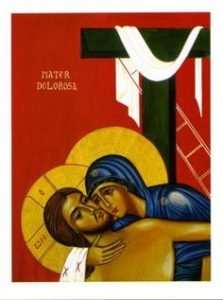 Although the mother of Jesus was seen, within the mystery of human salvation, as the representative of humanity in need of salvation, she was the closest to the Savior and the worthiest receptacle of the new life.
Although the mother of Jesus was seen, within the mystery of human salvation, as the representative of humanity in need of salvation, she was the closest to the Savior and the worthiest receptacle of the new life.
In the medieval West, the Augustinian understanding of original sin as inherited guilt made it inevitable that Mary be approached in terms of an “immaculate conception,” as the object of a special grace of God that made her in advance worthy of divine motherhood. The East did not follow that trend, because the consequences of the sin of Adam were seen as inherited mortality rather than as guilt, so that there was no need to see Mary in isolation from the common lot of humanity. However, there developed in the East the tradition of her eschatological glorification after death. Anticipating the general resurrection, her Son made her, as His mother, inseparable from his own risen body, above the angelic powers themselves.
Christ and the Holy Spirit
The Synthesis of Maximus the Confessor
The place of Maximus the Confessor (580-662), in the history of Christian doctrine is primarily associated with his defense of Chalcedonian orthodoxy against Monotheletism (the belief that Christ had only one divine-human “will”). Indeed, for Maximus, real humanity is dynamic, creative and endowed with a proper “energy”: this was, indeed, the case with the humanity of Christ who, being a man, possessed a human will distinct from the divine. This human will of Christ was restored in conformity with the original and eternal purpose of God in his design of humanity. In monotheletism, the humanity of Christ, although accessible to “contemplation”, did not possess any “movement” or energy proper to itself, and the Chalcedonian definition, which affirmed that “the characteristic property of each nature of Christ was preserved” in the hypostatic union, had lost its meaning. The merit of Maximus was, therefore, in having decisively counteracted a “monophysitic” trend which interpreted “deification” as an absorption of humanity into divinity. For Maximus, deification was to be seen not as a denial but as a reaffirmation and restoration of created humanity in its proper and God-established integrity.
Chalcedon asserted that Jesus was fully God and fully Man in every and all respects.
